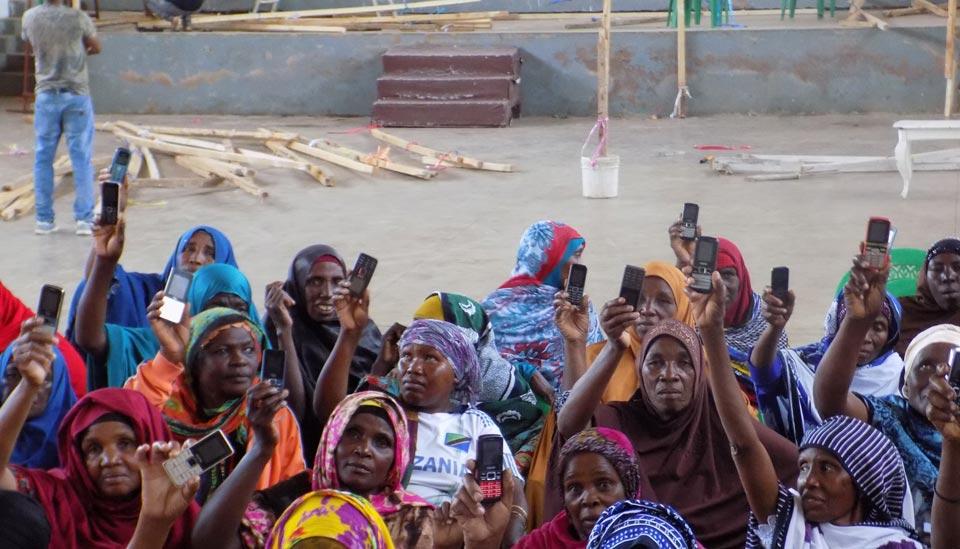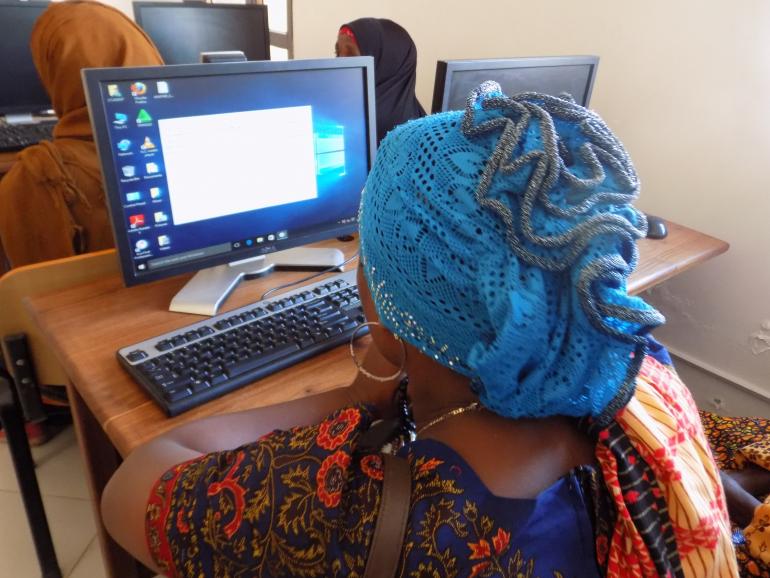
Image description: Photo of women holding up basic mobile phones at Kondoa Community Network. Image source: Kondoa Community Network
With growing populations, decentralisation of opportunities is important, and the internet is a crucial way to achieve it for both urban and rural communities. In order to bridge the digital divide(s), gender should be at the core of the development circle to ensure equal access to services and opportunities. In Tanzania, slightly over 23 million people are internet users which is an internet penetration of 43%, with 86% of them accessing the internet via mobile phones. Governments are moving to e-services now more than ever but access challenges make it difficult to optimize these services for all. This is especially true for targeted groups like the LGBTQA community that have withdrawn by fear of their activities being surveilled as was the case during the gay crackdown online instigated by a prominent Governor.
Agencies like regulators offer penetration data however the statistics are rarely disaggregated by gender, making it difficult to decipher access gaps between male and female users. Forgetting the fact that the internet’ is being accessed differently by different groups especially based on gender. To make meaningful decisions around internet access the internet has to be looked at through the lens of gender to pick up the disparities among different groups. Communities of trust are often built among minority groups such as women who leverage the internet as a medium to create relevant content, communicate, mobilise and gain access to information. Without access, groups like women who are widows face challenges to access important information like legal services.
“The Internet is not a luxury, it is a necessity” - President Barack Obama
Aziza like many widowed women in the small town of Kondoa was left with heavy responsibilities without the support of her significant other. She serves as a leader in the local women widows group KIWAJAKO pushing for opportunities and a better life. Among other things, Aziza is a mother, a clothes retailer and a community worker who mobilises fellow widowed women. The women she works with live in the outskirts and rural areas of Kondoa, a district in the capital city of Dodoma, Tanzania. In most parts of these villages mobile connectivity is a challenge owing to the geography, and people have to walk miles to get good cell reception. To such communities the internet seems like a far-fetched dream they hear of but can’t reach.
The small group of widows Aziza leads has over 100 women who work to reach out to communities miles away using motorcycles or walking long distances to provide health education and support. The presence of mobile communication revolutionised the way communication takes place, such that in case of an emergency this group could rely on calling for medical services. However due to the geographical isolation of some of these villages even that is a challenge, and in 2017 KIWAJAKO’s grant to support the local women lapsed. It was left to champions like Aziza and Kanaeli among others to use personal time and resources to visit some of the patients in the outlining villages. Because of distance and cost it's not something they could do often and most often would rely on updates via phone which was not timely, and a one way trip to some villages can cost as high as 5$ which most families cannot afford.
When Kondoa Community network was initiated and Aziza became one of the members of the board, she and many other women learned about the opportunities the internet can accord them. One of them being access to educational content and economic opportunities they could leverage from knowing how to research markets and advertise on social media platforms. Kondoa Community Network (KCN) is the first community network to pilot the use of television white space (TVWS) in rural areas to address the issue of the internet gaps in Tanzania. Among the key objectives of the network according to the Project Manager Dr.Matogoro is to bridge gender gaps by ensuring women and girls in Kondoa are connected and make meaningful use of the network.
KCN is the first community network to pilot the use of television white space (TVWS) in rural areas to address the issue of the internet gaps in Tanzania.

Image description: Woman looking at computer. Image source: Kondoa Community Network
KCN also connect schools and allows access to community members such as the women's group of KIWAJAKO who are now grasping the opportunities the internet can accord them. Most members of the group are entrepreneurs with little or no education but who are learning to make use of simple internet-enabled platforms like Whatsapp and Facebook to get information and to communicate. Despite the progress made in understanding the role of the internet, they still struggle with the other side of access. Most of the women do not own smartphones with the prices of these devices being fairly high. For those who own such phones, the challenge of how to tap into the resources it offers and the lack of relevant content is real.
One of the schools connected to KCN is Kondoa Girls Secondary School, a government-owned high school with over 500 girls. The school is located around 4 Km from the small town of Kondoa. According to the Tanzanian education system, high school is the bridge to entering university hence a crucial stage in any student’s journey. Most of these schools do not have access to a variety of learning resources which is paramount to good performance. Since getting connected to KCN one of the teachers Mr.Pendaeli pointed out “access to the internet has brought significant impact to both teachers and students, it has made it easy to get teaching materials and carry out administrative tasks such as uploading reports to government entities on student enrolment among others”. Before KCN the teachers had to frequent Kondoa town to be able to upload information especially for administrative purposes, with the presence of internet this has been made easy.
With the few computers the school owns, the students and teachers now have access to numerous material and learning resources available online. The way of teaching has also been revolutionised such that new techniques are now been made use of. The school came out number 12 out of the 26 schools in Dodoma region in this year's result with 250 out of 252 of the girls having passed. About 98% of the students have high grades of division I-III which qualifies them to join Institutions of higher learning.
The results just prove further how good teachers coupled with the availability of diverse learning material available can yield great results. The girls at Kondoa Girls are not the only ones to enjoy the network miles away from the town. Ula Secondary School and Bustani College are connected to KCN and are reporting similar advantages to being connected. The chair of KCN’s committee who also runs a computer school that is connected to KCN stated that “women are making good use of the internet for their businesses including social issues” and at his centre The Study Zone there are several young women enrolled to learn computer skills.
With the few computers the school owns the students and teachers now have access to numerous material and learning resources available online.
On 19 September 2018, the Ministry of Health, Community Development, Gender, Elderly and Children in Tanzania banned the airing of all family planning advertisements on radio and television pending further notice. This suspension has made it difficult for women and girls to get information on family planning that was once available through commercials on television and radio. Just two years prior in 2017, the President had declared that girls who gave birth should not be allowed to return to school using regulation No 4 of the Education Regulations, (Expulsion and Exclusion of pupils from schools) G.N. No.295 of 2002 as a basis for expelling pregnant girls from schools. While this might not seem at face value as a huge challenge but with internet connectivity, the challenges to accessing sexual and reproductive health education is made easier even in the case of such a ban as you cannot police what is available on the internet.
According to the GSMA Connected Women, The Mobile Gender Gap Report 2019 fewer women access the internet, and this is linked to the lower likelihood of them owning a mobile phone and using mobile internet. The report also states “the prices of handsets, which despite falling, can still be prohibitively expensive for the remaining unconnected population”. For minority groups such as people with disabilities and women, access could be a determining factor for empowerment and ability to harness opportunities, and the same applies to women in communities such as Kondoa.
To women like Aziza that are championing health and economic empowerment for other women and special groups like the disabled, the internet has the power to make their work easier.
Community networks like KCN are breaking these barriers by offering the opportunity for the female population to gain information on important issues regarding their health, rights and opportunities. The internet plays the pivotal role of decentralising opportunities for communities who don't have equal access due to physical, social and economic barriers. However they need more support to bridge the barriers of access to technology including infrastructure, devices, local content and the technical knowhow of using the internet. To women like Aziza that are championing health and economic empowerment for other women and special groups like the disabled, the internet has the power to make their work easier. But all these dreams will be short-lived without policies that allow licensing of community networks. This includes a model around registering a community network, at the moment KCN is registered as a community-based organisation which does not fully embody what KCN really is. It will go a long way if some form of policy is in place on licensing community network as service providers in their communities.
- 6764 views







Add new comment